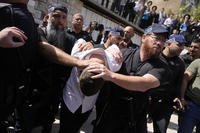Special Operations troops risk losing the competitive edge that they gained from years of combat in Iraq and Afghanistan due to the sequester budget cuts, said Adm. William McRaven, head of U.S. Special Operations Forces, on Wednesday.
"We are working very hard not to lose those relationships" and integration with the conventional forces, primarily in the Army and the Marine Corps, said McRaven, head of the Special Operations Command and considered the architect of the raid that killed Osama Bin Laden.
"We've got to keep those relationships through (joint) exercises," McRaven said, but the opportunities for training exercises were being cut as the Defense Department struggles to meet the cost-cutting demands of the Congressional process sequestration, which could take more than $500 billion out of defense over the next 10 years.
Currently, "the integration is as good as I've seen it" between the special operators and the regular forces, McRaven said. "We do not want to lose the goodness of what's come out of the last 12 years" of war in terms of seamless coordination, McRaven said at a forum sponsored by the Institute of Foreign Policy Analysis and the Fletcher School at Tufts University.
Officers working with McRaven echoed his concerns about sequestration.
"In a resource-constrained environment, we have to make some tough choices," said Vice Adm. Charles J. Leidig, Jr., deputy commander for Military Operations in the Africa Command.
"We don't know yet the budget impact" on special operations' plans for meeting new challenges after the wars in Iraq and Afghanistan, said Brig. Gen. Darsie D. Rogers, Jr., deputy commander of the Army's Special Operations Command. "We do recognize that we're going to have to get better, not bigger," Rogers said.
Defense Secretary Chuck Hagel has pledged to protect Special Operations, along with cyberwar programs and the development of the F-35 Joint Strike Fighter, from sequestration, but McRaven said the cancellation of training exercises would impact his troops.
"Some of that funding is being cut," McRaven said, referring to earlier remarks at the forum by Deputy Defense Secretary Ashton Carter.
In his address, Carter said the main priority for the Defense Department under sequestration was "to shift the great weight of the Department of Defense, both intellectual and physical, that has been devoted to Iraq and Afghanistan, to the Asia-Pacific region," while building on lessons learned from Iraq and Afghanistan.
"This last point -- how to build on lessons learned and how to use our forces most effectively -- is where SOF (Special Operations Forces) are central to the transition," Carter said.
Carter underlined McRaven's concerns on the cancellation of exercises under sequestration. He said that 12 combat-coded Air Force squadrons and 18 training squadrons have already been grounded. The Army has cancelled the nine remaining mission command exercises this year, and all but one of the remaining brigade decisive action rotations at Army Combat Training centers.
"Each time training is cancelled, it leaves commanders and their staffs unprepared for unexpected contingencies," Carter said.
Carter noted that "there are more than 9,000 SOF personnel operating in 92 countries" currently, which is why "the Department prioritized special operations capabilities in our defense strategy, and will continue to do so."
"The return on investment" from Special Ops justified the priority, Carter said. The budget for Special Operations in fiscal 2013 amounted to less than 2 percent of the entire DOD budget, Carter said.
"Even if you combine it with the service-provided capabilities that support special operations, it's still less than 4 percent of the entire budget," he said.






























